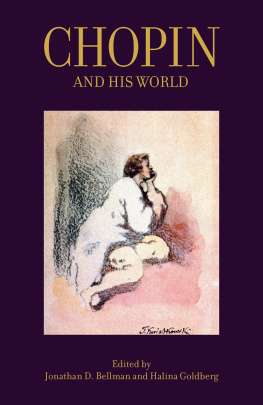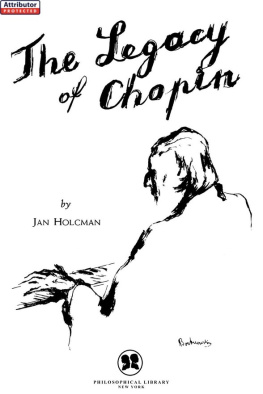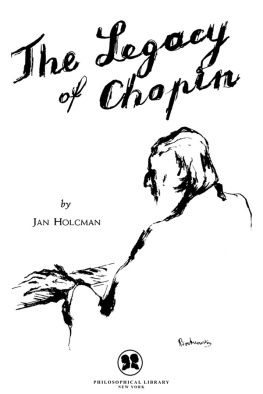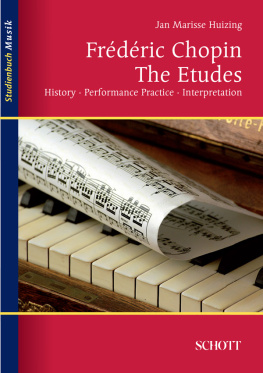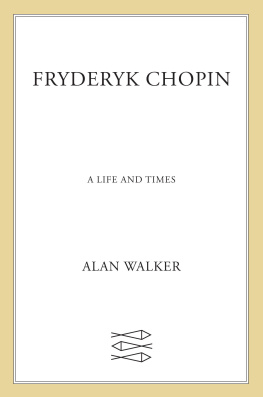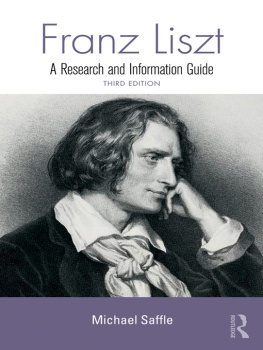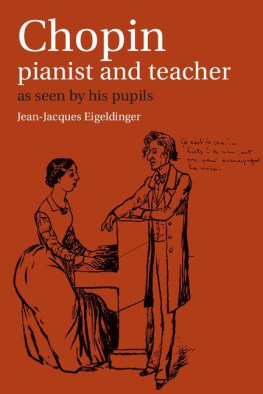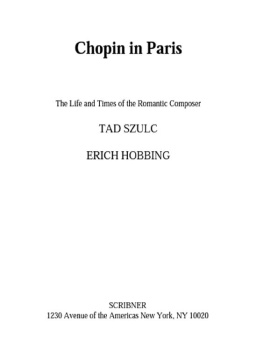
CHOPIN AND HIS WORLD
CHOPIN
AND HIS WORLD
EDITED BY
JONATHAN D. BELLMAN AND HALINA GOLDBERG
PRINCETON UNIVERSITY PRESS
PRINCETON AND OXFORD
Copyright 2017 by Princeton University Press
Published by Princeton University Press, 41 William Street,
Princeton, New Jersey 08540
In the United Kingdom: Princeton University Press,
6 Oxford Street, Woodstock, Oxfordshire OX20 1TW
press.princeton.edu
All Rights Reserved
For permissions/credits, see page x
Library of Congress Control Number: 2017935498
Cloth ISBN: 978-0-691-17775-5
Paper ISBN: 978-0-691-17776-2
British Library Cataloging-in-Publication Data is available
This publication has been produced by the Bard College Publications Office:
Mary Smith, Director
Irene Zedlacher, Project Director
Karen Walker Spencer, Designer
Text edited by Paul De Angelis and Erin Clermont
Music typeset by Don Giller
This publication has been underwritten in part by a grant from Roger and Helen Alcaly
Printed on acid-free paper.
Printed in the United States of America.
1 3 5 7 9 10 8 6 4 2
The editors would like to dedicate this book to the master pianists of the Golden Age: those who flourished and were trained in the years 18501925. From their teachers, they inherited the memories of Chopins world, the sounds he knew and recomposed. Their Chopin recordings, which stretch back to the dawn of the recording era, are a priceless legacy, and we are forever in their debt.
Contents
Acknowledgments
The editors wish to thank above all the president of Bard College and artistic co-director of the Bard Summer Festival, Leon Botstein, for inviting them to be scholars-in-residence at the 2017 festival, Chopin and His World, and to edit this volume. His teamand our friendsChristopher Gibbs, artistic co-director, Byron Adams, program committee, and Irene Zedlacher, executive director, have been unfailingly warm and friendly throughout this process. A crown of laurels to Paul De Angelis, of Paul De Angelis Books, who edited the editors and kept things organized, sane, and on track from the very beginning. His sober guidance and eagle eye made this very complicated project somehow manageable, and we are much in his debt. The entire team assembled by the Bard College Publications OfficeMary Smith, director of publications; Erin Clermont, copy-editing; Don Giller, music typesetting; Karen Spencer, design; Scott Smiley, indexingand at Princeton University Press have produced a handsome volume, and we are grateful to collaborate with them on this project.
Above all we would like to thank our contributors, in alphabetical order: Leon Botstein, Jean-Jacques Eigeldinger, Jeffrey Kallberg, David Kasunic, Anatole Leikin, Eric McKee, James Parakilas, John Rink, and Sandra Rosenblum. The opportunity to work with international Chopin scholars on this project has been a gift indeed.
Permissions
The following copyright holders have graciously granted permission to reprint or reproduce the following images:
National Museum, Pozna/Culture-images/Lebrecht for Chopins Polonaise (Ball at the Hotel Lambert in Paris) by Teofil Kwiatkowski, (pp. 305 and 310).
Credit is extended as well to the publishers of Eras of the Dance: The George Verdak Collection (Montgomery, AL, 1976) from which we have taken La menuet de la Cour, attributed to Le Couteur, .
The authors, editors, and publisher have made every effort to trace holders of copyright. They much regret if any inadvertent omissions have been made.
CHOPIN AND HIS WORLD
Introduction
HALINA GOLDBERG AND JONATHAN D. BELLMAN
The life of Fryderyk Franciszek Chopin (18101849), the child of a French emigrant to Poland and a mother from impoverished Polish nobility, was framed by key historic events that defined his worlds in Warsaw and in Paris, exerting a profound impact on his professional and personal choices and on his art. In 1807, less than three years before Chopin was born, Napoleon Bonaparte established an eastern outpost in Warsaw in preparation for his Russian offensive. As a consequence, the Napoleonic campaigns cast a shadow over Chopins earliest years, though Warsaw began to flourish after the 1815 Congress of Vienna. Similarly, the Revolutions of 1848, in particular the overthrow of the July Monarchy in France, darkened the composers last years; he suffered a dramatic loss of income as his students and audiences fled the political turmoil in Paris, and it became impossible for him to sustain himself. These circumstances and the nasty breakup in 1847 from George Sand (the successful French writer who had been his consort for nine years), necessitated the ill-fated tour of Great Britain, whichgiven his fragile constitution at the timeundoubtedly hastened his demise.
Other political upheavals left indelible marks on Chopins biography, too: just as he was entering adulthood, the Revolutions of 1830 shook Europe. The one in Paris was successful; it established the the July Monarchy that held sway during most of Chopins years there and empowered the social circles that were later amply represented among Chopins students and audiences. The revolution in Warsaw, however, which was intended to restore sovereign Poland, failed. This forced Chopin, about to start a concert tour, to become a permanent exile from his native country, and defined his mature personal and musical identity as that of Polish political migr in France. The historical events culminating in the Polish revolution of 183031, known as the November Uprising, explain much about Chopin, his music, and his world.
Sixteenth- and seventeenth-century Poland, at the height of its political and military power, comprised the territories of much of todays Poland and large parts of western Ukraine, Belarus, and Lithuania (with which it had had a dynastic union since 1386 and formed the Polish-Lithuanian Commonwealth in 1569). It fended off hostile neighborsespecially the Teutonic Knights, an ostensibly religious order founded to protect pilgrims in the Holy Land but better known for its territorial incursions into northeast Poland and the Baltic lands, which were characterized by brutality toward civilians and the use of mercenariesand contributed to important military and diplomatic efforts of its allies. The most famous of these events (usually regarded as one of the proudest moments in Polish history) was the 1683 defeat of the Ottoman army at the Battle of Vienna, where the Polish King John III Sobieski, in command of the combined forces of the Polish-Lithuanian Commonwealth and the Habsburg-headed Holy Roman Empire, decisively halted the seemingly relentless northward expansion of the Ottomans.
Thereafter, though, Poland slipped into an unstoppable decline. Starting in 1772, Polands territory was gradually dismantled by its neighborsRussia, Austria, and Prussiain a series of three partitions, the last of which (1795) obliterated Polands name from the map of Europe for more than a century. A few heroic efforts to stop these eventsthe Constitution of the Third of May 1791, which intended to rectify the political corruption that caused Polands decline, and the Kociuszko Insurrection in 1794, an uprising led by the Polish general, Tadeusz Kociuszko, who earlier had distinguished himself fighting in support of the colonists in the American Revolutionary Warhad little long-term effect, and only in 1918 was sovereign Poland reinstated and ratified in the Treaty of Versailles, at the close of the First World War.
When Napoleon entered Prussian-occupied Warsaw in 1807 he was cheered by the locals. With him were the Polish Legionsmilitary units of Polish exiles, formed in Italy under the leadership of General Jan Henryk Dbrowskiwhich had fought under the Little Corporal since 1797. Bonaparte recruited them with guarantees of restoring sovereign Poland, a promise unfulfilled beyond the establishment of the Duchy of Warsaw, a puppet state encompassing the territories immediately around Warsaw. In place of sovereignty, Poland saw economic ruin, as Napoleons forces drew resources from local industries and agriculture, and suffered massive devastation brought upon by his reckless military campaigns. Among the thousands of Polish soldiers who perished under his command was the revered nephew of the last King of Poland, Prince Jzef Poniatowski, who won numerous battles for Napoleon but died tragically during the 1813 Battle of Leipzig. Conditions in Warsaw were doubtless dismal in this precarious time, which was when Chopins father, Nicolas (Mikolaj), received a teaching post there and relocated his family (including the infant Fryderyk) to the capital city.
Next page
